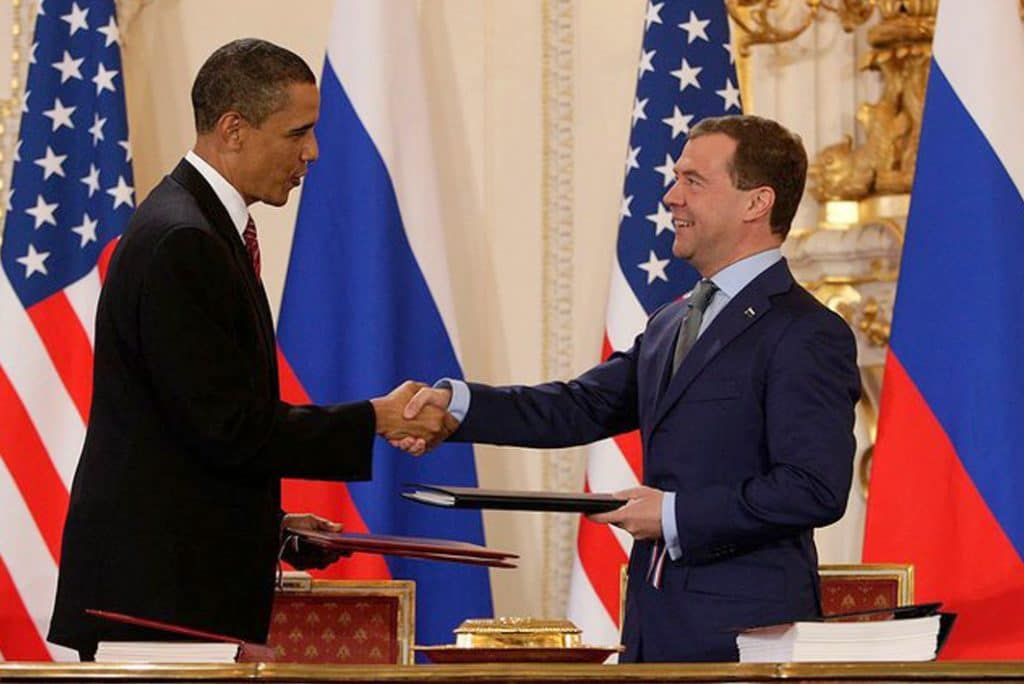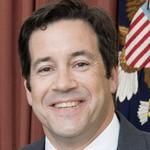Jon Wolfsthal assesses the suspension of Russian participation in New START
By John Mecklin | February 21, 2023
 Presidents Obama and Medvedev sign New START in 2010.
Presidents Obama and Medvedev sign New START in 2010.
In the immediate aftermath of Russian President Vladimir Putin’s announcement that Russia would suspend participation in New START, I asked Jon Wolfsthal, senior advisor to Global Zero and a member of the Bulletin’s Science and Security Board, for his responses to various aspects of Putin’s speech. Wolfsthal served previously as Special Assistant to the President of the United States for National Security Affairs and senior director at the National Security Council for arms control and nonproliferation. Earlier, Wolfsthal served for three years as special advisor to then-Vice President Joe Biden on issues of nuclear security and nonproliferation.
During his time in government, he was involved in almost every aspect of US nuclear weapons, arms control, nonproliferation, and security policy.
This interview was conducted via email.

John Mecklin: How do you assess President Putin’s intent in announcing that Russia would suspend participation in the New START arms control agreement? The announcement seems just to put the status quo (adherence to the treaty’s number limits, but no inspections or talks) into words. So why make the statement? What do you think is the intended effect?
Jon Wolfsthal: My sense is Putin is grasping at the Russian Cold War play of trying to stoke divisions between the US and Europe by raising the risk of nuclear war. Trained as a 1970s/80s KBG agent, who lived in East Germany, Putin may believe the best way to counter European unity is to make Europeans question the wisdom of sticking with the West and with the United States. But my sense is he is very out of touch with how both Eastern and Western Europe see the war and now view Putin and Russia. And the loss of data exchanges can degrade confidence in US knowledge about Russian nuclear forces over time. Not critical, but a long-term concern.
Mecklin: How should the United States and its allies respond to the announcement, immediately and over the rest of this year?
Wolfsthal: The United States and its allies should show complete lock-step unity in condemning needless Russian moves but refuse to take the bait by changing US nuclear status or forces. The United States has always and will always have the ability to respond if the nuclear balance with Russia changes, but Russia cannot quickly change the balance of forces with the United States. The United States continues to have many more weapons than it needs to deter Russia. Anything we do to respond in the nuclear arena or that increases the risk of escalation plays into Putin’s hands and should be avoided.
Mecklin: What do you make of the assertion that Russia is ready to resume nuclear testing if the United States does? I wasn’t aware of any special/new push in the United States for nuclear testing. So why did Putin bring it up?
Wolfsthal: I don’t think the United States has any interest or plans to resume nuclear testing. US lab directors have said repeatedly that the US know more about how US weapons work and why than when we used to explosively test. That remains true today. If Putin tests, it will be because he wants to scare us, or he is worried his own weapons don’t work as advertised.
Mecklin: Do you know anything, either way, about the claim that the United States is helping Ukraine use drones to strike facilities that include strategic nuclear assets? It would seem unlikely that the United States would knowingly do such a thing.
Wolfsthal: I don’t know anything about how involved the United States is, but I suspect Ukraine knows where these bases are and doesn’t need much help in holding them at risk.
Mecklin: What does the United States (or Russia, for that matter) lose if New START inspections don’t happen? That is, what do both countries learn from inspections that they can’t learn from satellites?
Wolfsthal: It is not that inspections give us something we cannot get through other means, but inspections improve the confidence we have in our understanding. Being on the ground, being able to conduct on-site inspections helps us validate our understanding of both how Russian nuclear forces operate and help fill in the gaps, sometimes, in what kinds of weapons Russian deploys and when. Inspections are extremely useful but only one part of how the United States tracks Russian forces.
Mecklin: How does Putin’s announcement relate to the current state of Russia’s invasion of Ukraine?
Wolfsthal: To me, the announcement shows that Putin is desperate for ways to change the dynamics of the war, both on the ground in Ukraine but in Europe. Leaders in strong positions don’t seek to change the nature of the competition or divert from a winning strategy. Putin is trying to change the conversation because he is losing power, influence—and the war.
Together, we make the world safer.
The Bulletin elevates expert voices above the noise. But as an independent nonprofit organization, our operations depend on the support of readers like you. Help us continue to deliver quality journalism that holds leaders accountable. Your support of our work at any level is important. In return, we promise our coverage will be understandable, influential, vigilant, solution-oriented, and fair-minded. Together we can make a difference.
Keywords: Jon Wolfsthal, New START, Putin, Russia, Ukraine, inspections, nuclear testing
Topics: Nuclear Weapons















